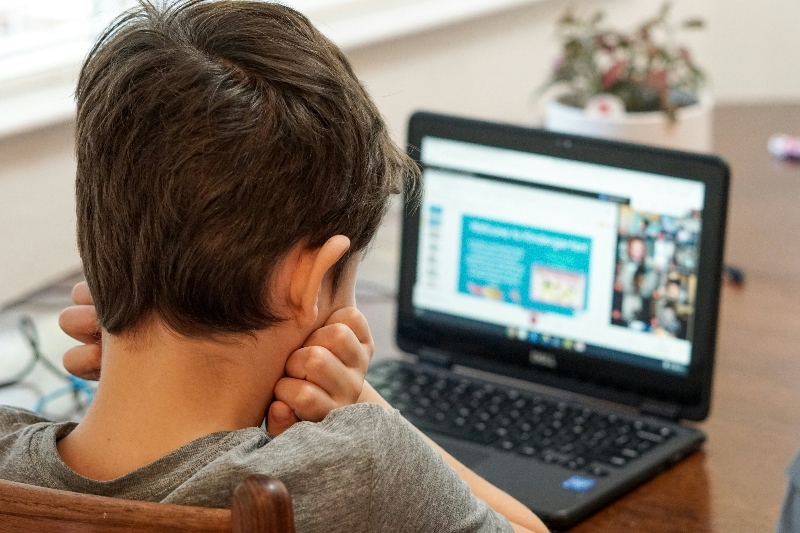AI, TikTok - how do we equip our children to make good choices?
TikTok, Snapchat, gaming, AI, deepfake porn – technology is advancing at such a speed that we sometimes struggle to navigate each new turn, writes Katharine Hill
So how do we equip our children to deal with the dangers, as well as to take hold of the opportunities?

A little verse tucked away in the Old Testament (1 Chronicles 12:32) gives us a clue. Ezra is naming those who came to fight for David against King Saul, and on his list, he includes ‘the men of Issachar’, who ‘understood the times and knew what Israel should do.’
These people not only understood the context they were living in, but more importantly they knew how to live in the light of the prevailing culture.
One of the most powerful cultural forces today is the fast-changing landscape of the digital world, with a recent arrival to the party being the science of Artificial Intelligence. As parents and carers, we need to understand the issues and also know what to do.
AI is an umbrella term for software that performs complex tasks that previously required human input, and we may be surprised when we consider how much it is part and parcel of our everyday lives. Many of us will have contacted customer services to track down a missing parcel, only to find that our chatty adviser ‘Leo’ is not a human being at all, but an AI robot who offers to resolve the issue.
Recognising every curve and wrinkle, face recognition has been described as the ‘AI bouncer’, protecting us against unscrupulous intruders and ensuring that our digital world stays secure. AI tailors our experience of social media, and provides us with a personal research assistant, trawling through labyrinths of information to provide us with exactly what it thinks we need.
In so many ways AI enhances our lives, but of course, there is a shadow side. AI tools have the ability to create realistic content that presents significant risks to our children, the most sinister being AI-generated sexual abuse material, AI grooming and deepfakes. The most ubiquitous form of AI is the chatbot – with ChatGPT the best-known example, which not just curates but also generates content for us to use.
While the possibility of our children being exploited by AI will, of course, be a worry for parents, with vigilance and intentionality there is much we can do to protect them and keep them safe.
What parents can do
Develop critical thinking
The prevalence of AI gives a great opportunity to help our children weigh the reliability of the information they come across, whether through advertising, conspiracy theories, deepfake news, photographs or videos. We can encourage them to be curious, to ask what the source of the information is.
Is it from a trustworthy source? Does it sound like information they already know to be true?
While we don’t want to encourage our children to be cynical, we can train them not to accept every piece of information at face value.
Check settings
Encourage children to think twice before sharing private information that could be misused. Ensure privacy settings are up to date and passwords are secure (many children share passwords as a sign of friendship).
Trust their instincts
Encourage them to make safe choices with the people they interact with online. If something doesn’t feel right, it probably isn’t. Encourage them to talk to us or someone else they trust and report anything suspicious.
Use AI positively
Rather than using AI to do their Spanish homework for them, we can encourage them to use it positively, for problem-solving and creativity. One family we know uses AI to introduce some healthy fun and competition. Each describes a picture to AI, and the one whose resulting picture most accurately resembles the original wins the game.
Another dad uses ChatGPT on their family nights to tell stories. He asks it to tell a story involving each family member and to include a random selection of objects. ‘The stories are amazing,’ he said. ‘Everyone enjoys it and feels involved.’
Despite the obvious dangers, we don’t need to be fearful or on the back foot. Our role as parents is a positive one. God’s plan is that the family is the place where our character is shaped and where we grow in maturity and wisdom.
In the everyday moments of family life, in the time we spend together, the conversations we have, on the school run, in the car and last thing at night, we have the opportunity to instil values in their hearts, equipping them so they can not only make wise choices to keep themselves safe, but also so they can enjoy the opportunities that AI has to offer.
So that like the men of Issachar, our children too will not only know the times – but know what to do.
Image | Thomas Park | Unsplash
Katharine Hill is a Director of Care for the Family, a national charity which aims to strengthen family life and help those who face family difficulties. As an established speaker and broadcaster, she has addressed thousands of people both across the UK and internationally on parenting and marriage issues.
She is the author of several books, including the popular A Mind of Their Own: Building Your Child’s Emotional Wellbeing In A Fast-Changing World, and Left to their own Devices? Confident Parenting In A Digital World
Do you have a view? Share your thoughts via our letters' page.
Baptist Times, 09/06/2025